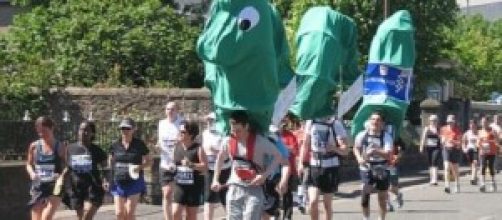The Norwich Half-Marathon is being held this Sunday and true to form the weather is not being its kindest, as heavy rain descends on the area, threatening to throw the best laid plans into turmoil and causing a real headache for the organisers. It makes you wonder just who would volunteer to organise such an event, given all the things that have to be considered and the potential pitfalls that need to be avoided?
Planning for a large event such as a city centre half-marathon (actually the Norwich race was moved out of the centre some years ago) typically begins right after the last one has finished.
The benefit of that is that the problems or mistakes that occurred in the latest running of the event will still be fresh in everyone's minds and also what actions were taken to resolve them at the time. An obvious requirement for anyone involved in the organisation then is their willingness to make themselves available for the planning meetings, something that (given all that needs to be addressed through the year leading up the event itself) can often clash with their everyday activities, especially if they have a full-time job and family commitments to fit in as well! A planning committee or group helps by dividing the tasks up between them.
Given the distance involved for any would be entrant (a shade over 13 miles) then the scheduling of the "race" (for many it is more of a challenge to get round) is important.
A summer event may seem like a good idea to ensure better weather conditions, but that also risks the weather being too good and athletes having issues over the heat factor. With that in mind (among other factors), Norwich moved their event back to the end of November to seek milder conditions. As with this year though, that can lead to the risk of adverse weather in the shape of heavy rain or strong winds.
The 'timing' during the year also has to seek a "free" weekend in the hectic running calendar, since if your event clashes with another major local race, then your potential to attract a big field may be reduced. As many Athletics clubs' annual existence is commonly driven by their major fund raiser (ie. the race they organise), then they need to maximise the likelihood that their field entry will reach the target numbers.
The day to hold the event on is often a Sunday to avoid too much disruption to locals and also to have the best chance of reduced traffic on the roads. The Norwich event was moved from the city centre out to the Norfolk Showground on the outskirts of the city some years ago, which as a result meant that the course includes country lanes but is mainly away from areas of heavy (likely) traffic. The downside of that is that bad weather often leads to plenty of water and debris on the course, making it tougher for the competitors and unpleasant for the marshalls. Fliers are often posted through the letterboxes of houses near the course before the day to pre-warn of the event, and temporary signs are attached to lampposts, but even then it has been known for many an irate motorist to vent their feelings at being delayed in their (usual) comings and goings by the event!
The local police and first aiders need to be contacted in advance to ensure they are aware of the event and have no issues. Commonly there will be both a police and first aid presence (in fact it is obligatory I believe from the health and safety aspect) on the day, with the club organising the race needing to enlist the support of a group of volunteer marshalls. These willing and typically "happy souls" will be positioned strategically all over the route and assist at the start / finish points, to ensure the smooth running of the race. Mobile phones and walkie - talkies are often commonly utilised to keep the communication lines going and to iron out issues as they arise.
Drinks stations are a vital element on a long race to ensure that the athletes do not de-hydrate and can top up their energy levels periodically.
Although a late autumn race avoids many of the issues through fluid loss, being involved in a sporting activity for over a hour or two necessitates topping up through fluid intake. Many gallons of water and wet sponges need to be transported to designated 'feeding stations' on the course and bodies supplied to hand out the drinks as the runners come past. The clear up effort after the event is also an arduous but necessary task, to ensure that the locals and their picturesque surroundings are not overly inconvenienced by the many pairs of feet that thunder past them on the day. A local half-marathon is not quite the Tour de France operation in terms of the clear up, but with several hundred runners and their supporters involved, refuse collection is a large consideration.

